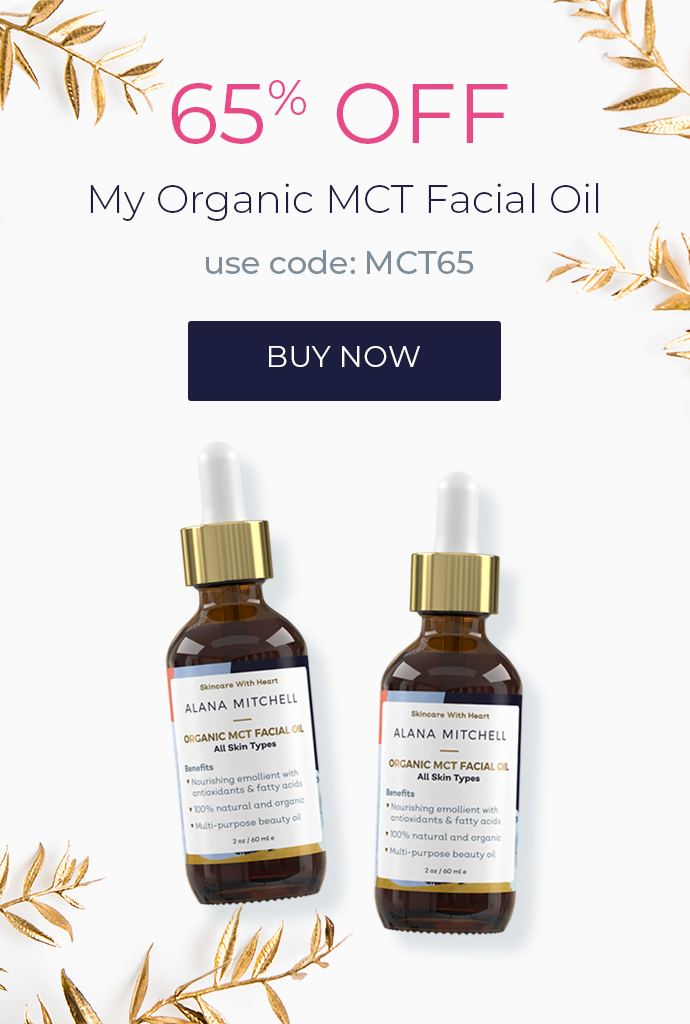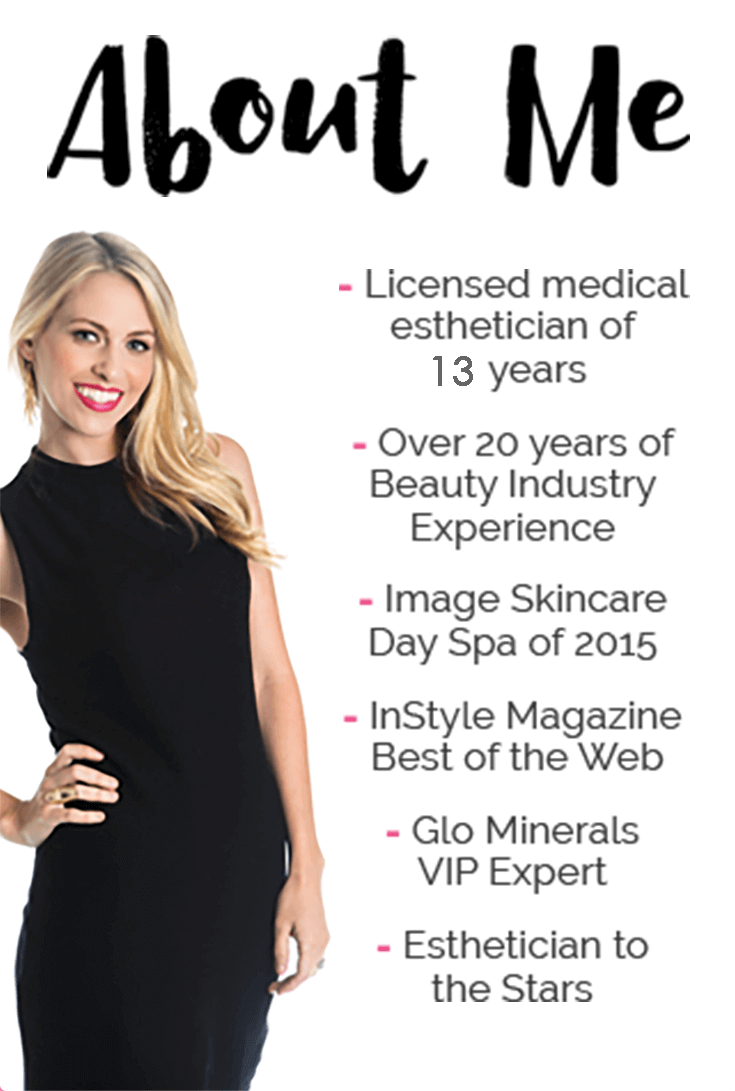What Should You Be Using In Your Skin Care Routine?
Take my quiz and get personalized recommendations from a
licensed esthetician!
The Ultimate Guide to Skincare Acids

Chances are you’ve been hearing a lot about “must-try” ingredients in skincare like hyaluronic acid, glycolic acid, and alpha hydroxy acid.
The thought of putting something called “acid” on your face may sound like a nightmare and a recipe for disaster if you have sensitive skin.
While acids sound scary, I’m here to tell you that the right ones aren't harsh.
In fact, they’re great, and can even help those with sensitive skin types!
Skincare acids are used to target a variety of concerns and have been shown to improve everything from signs of aging to hyperpigmentation and texture.
A 2014 study observed 52 volunteers as they used a skincare regimen that included alpha hydroxy acids (AHAs) in conjunction with vitamins B3, C, and E.

There’s an acid to benefit every skin type and concern, whether you’re targeting those little fine lines, acne, or dry skin.
Acid for DRY skin? I know.
Today I’m going to highlight my 10 favorite acids to incorporate into your skincare routine.
I’ll let you know what each does so you can find one that works for you!
Then I will discuss how acids are used in chemical peels and recommend some of my favorite skincare products with acids.
First Thing's First, Some Tips for Using Acids in Skincare

Start With a Patch Test
Whenever you introduce a new ingredient or product to your skincare regimen, I always recommend doing a patch test first to ensure your skin doesn’t have a reaction.
To Do a Patch Test:
Apply a small amount of the product to the inside of your wrist or behind your ear. Wait 24-48 hours to make sure there’s no reaction before using it on larger areas. If you notice any redness or irritation, wash the product off immediately and discontinue use. Better safe than sorry!
If You’re Timid, Start With a Wash
Not sure how you feel about applying a concentrated acid formula to skin?
Start off with a wash that contains the acid ingredient.
As dermatologist Dr. Meghan O’Brien explains, “With a wash, you can limit the amount of contact time with the skin and avoid over-drying.”
Follow Instructions
Make sure you refer to the directions for the use of your acid formulas.
Some aren’t meant to be used daily or may suggest you start by applying just a couple times a week until your skin adjusts.
Some exfoliating formulas can make skin sensitive to sun exposure and should only be used in your PM skincare.
Following instructions will help you avoid irritation and make sure you get the most out of your product!
Don’t Limit Application to Your Face
The delicate skin on your neck and chest can benefit just as much from your skincare as your face!
Acid formulas can be used to address spots on your chest, anti-aging ingredients can help firm and tone your neck, and acne on your back and shoulders can be cleared up with blemish-busting products.
Practice Patience
Don’t get discouraged and give up on a product if you don’t see immediate results!
Many formulas take time and regular application in order to deliver effective changes.
It’s also helpful to take some before and after pics a couple months apart to compare and note results.
There’s even an app called RYNKL that will help you track subtle changes so you can tell if your products are actually working!
Now let’s take a look at all these amazing acids and each of their skin-boosting superpowers!
10 Skincare Acids and What They Do

What It Does
Do you have dry or dehydrated skin? Hyaluronic acid is about to be your new bestie!
This mega-moisturizing ingredient is a humectant, which means it sits on the surface of your skin and grabs moisture out of the air, holds it, and delivers it to your skin to absorb for deep hydration.
The hyaluronic acid molecule can hold 1,000 times its weight in moisture!
It also helps reduce the appearance of fine lines by plumping skin to fill out wrinkles. HA is one of my faves for restoring skin’s vitality and moisture!
Best For: Dry/dehydrated skin, treating fine lines

What It Does
You’ve probably seen this ingredient featured in acne-fighting formulas, and with good reason!
Salicylic acid is a beta hydroxy acid (BHA) whose super powers are cleansing and unclogging pores by breaking up dead skin cells and loosening up blackheads.
While salicylic acid is recommended for treating oily or acne-prone skin, it’s also a great spot treatment to zap blemishes for people with normal/combination skin.

And, it’s a much better alternative to picking and popping blemishes - which can lead to spreading infection or scarring.
Salicylic acid busts breakouts and blemishes by killing acne-causing bacteria. Plus, it's an anti-inflammatory that calms and reduces swelling and redness from pesky pimples.
Salicylic acid-based cleansers and moisturizers are also recommended for treating keratosis pilaris (those little hard bumps that may pop up on your thighs or the back of your upper arms).
Best For: Oily, acne-prone skin, spot treating blemishes, keratosis pilaris

There a few members of the AHA family. Keep on reading!

What It Does
Citric acid is derived from (surprise!) citrus fruits like lemons and oranges.
It packs some serious antioxidant power to help fight free radicals.
Free radical damage shows up in the form of wrinkles, sagging, and discoloration. Antioxidants help skin rebuild collagen and encourage the growth of new, healthy cells.
Best For: Fighting free radical damage, signs of aging

What It Does
Glycolic acid gives skin a mild peeling and exfoliating effect.

Don’t let the word “peel” scare you. All this means is that the top layer of dead skin cells is gently removed.
This encourages cellular turnover so your skin produces new cells and rebuilds collagen and elastin.
As a result, you'll see:
- A brighter complexion
- Softer skin
- Reduced wrinkles
- More firm and supple skin
- Fewer blemishes
- Lightened dark spots
Best For: Anti-aging, dull skin, hyperpigmentation, blemishes

What It Does
If you have sensitive skin that gets red or irritated at the mere thought of exfoliation, this ingredient is for you.
Lactic acid offers all the benefits of its glycolic sister but in a gentler, less-irritating formula.
It effectively softens and improves skin’s texture, while smoothing away fine lines, but with a much milder exfoliation to stimulate cell turnover.
You’ll still get a more even, youthful complexion without the redness or discomfort of harsher formulas.
Best For: Sensitive skin, anti-aging, restoring suppleness

What It Does
L-ascorbic acid, AKA good ol’ vitamin C, is an antioxidant powerhouse that combats the effects of free radical damage.
It’s stellar at lifting darks spots and hyperpigmentation and helps skin rebuild collagen to smooth fine lines.
For a potent formula, look for a vitamin C serum which will contain a higher concentration of L-ascorbic acid to deliver effective results.
Best For: Anti-aging, treating free radical damage, brightening dark spots

What It Does
This vitamin A derivative is basically the poster child of anti-aging skincare because it does it all!
First, it exfoliates and dissolves dead skin to help alleviate dullness and clear up acne.

Second, it kick-starts collagen production to fill out fine lines and cellular turnover to give you a glowy complexion.
Plus, it lightens up dark spots and helps fight photo-aging from sun exposure and free radicals.
Note: This ingredient seriously does it all, but it has been known to cause irritation, so make sure to follow instructions.
Also, it can make skin more sensitive to sun exposure, so I always recommend using retinol in your PM skincare and applying SPF protection during the day (but, you’re already doing that anyway, right?).
Best For: Anti-aging, treating acne

What It Does
If you’re looking to brighten dark spots, kojic acid is an awesome natural ingredient that will help get the job done.
It works to brighten and even your overall complexion by decreasing melanin (pigment) production. As dermatologist, Dr. Annie Chiu, explains, “
Best For: Treating dark spots, hyperpigmentation

What It Does
This is another one of those powerful antioxidants to help fix signs of aging caused by sun damage and free radicals.
Include ferulic acid in your skincare to reduce wrinkles, dark spots, uneven skin, and photoaging. Plus, it helps skin rebuild to protect against further damage. Hooray!
Best For: Anti-aging, sun damage

What It Does
This ingredient offers all of the exfoliating benefits and effects of alpha-hydroxy acids but is much gentler on the skin.

You’ll get all the magic of a brilliant, renewed complexion and collagen synthesis but through a milder process. This makes mandelic acid a go-to for those with sensitive skin.
Best For: Sensitive skin
What About Chemical Peels?
While we're on the topic of how acids can be beneficial to your skin, I thought I'd address a popular treatment to improve certain skin conditions: chemical peels.
Chemical peels are controlled "damage" to the skin on your face, neck, or hands.
What I mean by this is acids are applied to the skin that causes it to exfoliate and eventually peel off, revealing the new, brighter, and smoother skin that was underneath.
Chemical peels aren't anything new - they were used by ancient Egyptians to enhance their appearance. What skincare practices weren't inspired by them? They figured it all out for us!
Chemical peels help improve these common complaints:
- Acne
- Scars
- Hyperpigmentation
- Melasma
- Wrinkles, fine lines, and crow's feet
- Sun damage
- Uneven texture
Generally, light-haired and fair-skinned people are the best candidates for a chemical peel.
Those with darker skin can have good results as well, depending on the condition being treated.
However, there is a higher chance of an uneven skin tone afterward.

Before undergoing a chemical peel, you should always have a consultation with your licensed dermatologist or medical esthetician to address your problem areas.
Chemical peels should always be performed at a doctor's office or a medical spa - never at home, or by someone unlicensed!
There are three "levels" of peels:
- Superficial: A mild acid is used to improve the appearance of your complexion. It does not penetrate below the epidermis. These peels can be repeated at 1-4 week intervals.
- Medium: The acids used are stronger and reach the middle of the dermis. There is a 1-2 week healing period. These peels are ideal for people who want more noticeable results than a superficial peel but don't want the risk and recovery time from a deep peel.
- Deep: This peel usually involves a pretreatment to prepare the skin and speed up the healing process. The strongest acid is used to penetrate into the lower dermal layer, and a local anesthetic and a sedative are used to manage discomfort. Only a single treatment is required, and the healing process will take 2-3 weeks. If you choose to have a deep peel, there is a greater chance your skin will appear smoother and brighter over a longer period of time. However, there are greater side effects.
Depending on the level of peel, you may experience stinging, redness, swelling, irritation, crusting, or peeling.
You may be prescribed medicines, creams, or ointments to provide relief. Your dermatologist or esthetician will provide you with more detailed care instructions.
No matter what, though, your skin will regrow and should fully heal - it just takes time!
Super Important:
The new skin is more sensitive!! Sun exposure and smoking after a chemical peel must be avoided because they can cause unwanted side effects, including infection and scarring. You absolutely need to wear SPF 30+ daily!!
Acids Used in Chemical Peels
Below are some popular options for chemical peels. Notice how some of them are on my list!
- Glycolic acid
- Lactic acid
- Salicylic acid
- Retonic acid
- Trichloroacetic acid: Used in medium-level peels, trichloroacetic acid evens out skin tone, acne, and fine wrinkles.
- Phenol: Reserved for a deep peel, this is the strongest acid. It's effective for deep wrinkles, scars, severe sun damage, and even pre-cancerous growths.
The appropriate acid will be chosen depending on your skin's needs.
Now that you’ve been introduced to my top 10 acids (the start of a beautiful friendship!) and chemical peels, let’s check out some of my favorite formulas that feature these amazing ingredients!
My Favorite Acid Skincare Formulas
Final Thoughts
See? Acids aren’t so scary after all!
There are so many that can offer great benefits.
I’m happy I got to share some of my favorites with you today!
Whether or not you choose to add acids to your skincare routine is a choice you have to make based on what’s best for your skin.
As long as you’re practicing good skincare, you can’t go wrong!
Wondering which acid is best to target your skin concerns? I’d love to help! Ask me in the comments section.
Top Brands
New Brands

Recent Posts

Are You Taking the Right Steps to Care for Your Skin?
Take the Quiz
Skincare Secrets!
10-step guide for healthy, beautiful skin after kids.
100% privacy. I will never spam you!



















